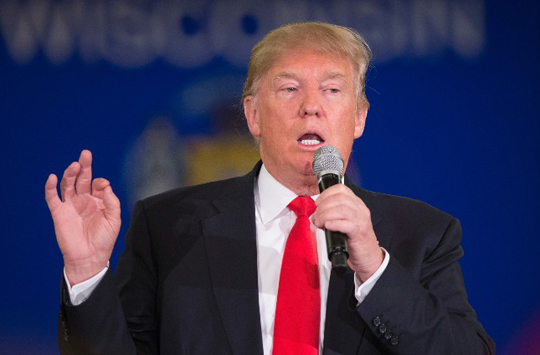Washington, Nov 24: President-elect Donald Trump said Tuesday he would “love” to clinch a deal to end the intractable conflict between Israel and the Palestinians, despite Israel's revived plans to build 500 new homes for Jewish settlers in annexed east Jerusalem.

“I would love to be the one who made peace with Israel and the Palestinians, that would be such a great achievement,” Trump said in an interview with The New York Times.
A New York Times reporter tweeted that Trump also suggested that his son-in-law Jared Kushner could help broker the deal. Kushner, who is married to Trump's daughter Ivanka, is from an Orthodox Jewish family.
Trump has raised Palestinian ire by proposing that Jerusalem should be recognized as Israel's capital, an idea contrary to traditional US policy.
Almost all US presidents have, in the past, tried their hands at brokering peace between the Palestinians and the Israelis — unsuccessfully.
The Israeli right has expressed particular satisfaction with Trump's election win, viewing it as a sign to resume or accelerate settlement building in the Israel-occupied Palestinian territories, and even the end of the idea of an independent Palestinian state.
The Israeli settlement plan is an ominous sign for Palestinians wary of a Trump presidency, an NGO said.
“The political significance of this action is that it is the first plan to be promoted since the US elections,” Betty Herschman from the Ir Amim NGO said.
The plan for 500 housing units in Ramat Shlomo, an ultra-Orthodox Jewish neighborhood in east Jerusalem of around 20,000, had been on hold since 2014, Ir Amim said.
The Jerusalem municipality downplayed the significance of the new housing units, saying the plans were “not new and were approved years ago.”
Nevertheless, the announcement is likely to be interpreted by some as a first step in Israel expanding its settlements in the wake of Trump's upset election victory.
Israeli right-wingers hailed his triumph as ushering in an administration far less critical of settlement expansion than that of outgoing President Barack Obama's.
The president-elect's adviser on Israel, David Friedman, told AFP last month that he does not believe Trump sees Jewish settlements in the occupied West Bank as illegal.
One Israeli minister said Trump's win meant “the era of a Palestinian state is over” while Meir Turjeman, chairman of the Jerusalem municipality planning committee, told public radio earlier in November that it meant suspended permits in east Jerusalem would be given the green light.
He said the municipality intended to authorize thousands of housing units that had been frozen.
The international community considers all settlements illegal and sees them as one of the largest obstacles to peace between Israel and the Palestinians.
Ahead of Wednesday's announcement France said the planned constructions would be “illegal.”
“The unabated continuation of the settlement policy only serves to increase tensions on the ground and undermines the prospects for achieving a just and lasting peace,” the Foreign Ministry said in a statement Tuesday.
Prime Minister Benjamin Netanyahu, whose government is considered the most right-wing in Israeli history, has so far been cautious in green-lighting settlements.
While many on the Israeli right are looking forward to Trump's inauguration in January, they are also wary of what Obama may do in his final days in office.
Obama's administration has expressed mounting anger over Israeli settlement policy and speculation has grown that he could launch a final initiative before leaving.
The UN Security Council is set to debate proposals for a draft resolution calling for a halt to settlement expansion in the Palestinian territories, with speculation Obama could break with recent US practice and support — or at least not veto — such a resolution before his term expires on Jan. 20.
Netanyahu last month expressed concern over any potential attempt but Lieberman on Wednesday seemed less concerned.
Asked if he expected any surprises from Obama before his term ends, Lieberman said: “I don't think so.”
“It is clear we are in a transition period, it is clear today — not only in Israel but in the world — we are waiting for new policies, a new administration.”
Obama has had frosty personal relations with Netanyahu throughout his two-term presidency.





Comments
Add new comment